Hong Kong's pro-democracy protests: A threat to China's one-party rule?
The people of Hong Kong gave a raucous and not-so-friendly welcome to their new leader at his inauguration. Will the fervor spread to the mainland?

A free daily email with the biggest news stories of the day – and the best features from TheWeek.com
You are now subscribed
Your newsletter sign-up was successful
On Sunday, Hong Kong swore in Leung Chun-ying, the city's third chief executive since Britain relinquished control of Hong Kong to China in 1997. Chinese President Hu Jintao attended the inauguration and celebrated the 15th anniversary of Chinese rule, but the festivities weren't so festive on the streets: Between 55,000 (police estimates) and 400,000 (organizers' guess) protesters marched through Hong Kong, demanding Leung's resignation, a say in his replacement — a group of 1,200 hand-selected electors choose Hong Kong's leader, with approval from Beijing — and an end to what they call the mainland's meddling in the semi-autonomous territory. Protests and free speech are one of the perks of Hong Kong's "one country, two systems" agreement with China's Communist Party. But the sheer size of the pro-democracy march — the largest anywhere in China since a 500,000-strong Hong Kong demonstration in 2003 — poses a challenge to the authoritarian regime in Beijing. In the march, for example, were hundreds of mainland Chinese protesting their own issues in the one place in China where it's legal. Could Hong Kong's drive for more freedom and democracy threaten the Chinese Communist Party's grip on power?
China is right to be worried: You have to feel a little bad for Leung, says Louisa Lim at NPR News. "It's a pretty bad first day at work when hundreds of thousands of people march through the streets calling for your resignation." But China could be the big loser. Beijing's "censors have been busy deleting pictures of the march on Chinese Twitter," but news gets out, even in China. It's certainly possible that "the massive protests could serve as an inspiration to mainlanders." That's something China's government, in its own difficult power transition, can little afford.
"'Political crisis' faces Hong Kong's new leader"
The Week
Escape your echo chamber. Get the facts behind the news, plus analysis from multiple perspectives.

Sign up for The Week's Free Newsletters
From our morning news briefing to a weekly Good News Newsletter, get the best of The Week delivered directly to your inbox.
From our morning news briefing to a weekly Good News Newsletter, get the best of The Week delivered directly to your inbox.
Hong Kong will steer its own course: "Our city remains a unique part of China," and as long as Beijing respects its agreements, Hong Kong can keep its core values of free speech, rule of law, and capitalism to itself, says Hong Kong's South China Morning Post in an editorial. "Further integration with the mainland is inevitable and should not be feared," but while we each have plenty to learn from the other, the sharing will and should be by choice not by force.
"A model for China if promises are kept"
Democracy would benefit both Hong Kong and Beijing: Hong Kong needs to change, says Simon Cartledge in the Financial Times (subscription required). Since the handover from Britain, it has kept much of its character, but it's also become "a lot less equal." Shaking up Hong Kong's dominant tycoon class could renew its core entrepreneurial spirit, and "only a move to real democracy and a directly elected chief executive offers the prospect of delivering such change." As China struggles with its own complex economic and social changes, China might choose to experiment with multi-party democracy, too.
"It is folly to say Hong Kong has not changed"
A free daily email with the biggest news stories of the day – and the best features from TheWeek.com